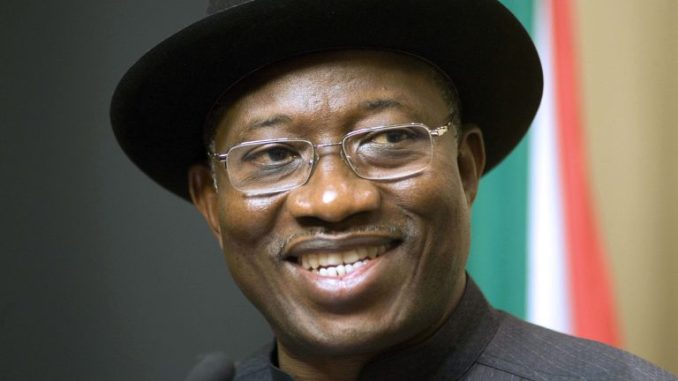
The Federal High Court in Abuja has been asked to stop former President Goodluck Jonathan from contesting the 2027 presidential election or any future presidential race in Nigeria.
In the suit marked FHC/ABJ/CS/2102/2025, a lawyer, Johnmary Jideobi, is seeking an order of perpetual injunction restraining Jonathan from “presenting himself to any political party in Nigeria for nomination as its candidate” for the 2027 poll or any future election.
Jideobi also wants the court to bar the Independent National Electoral Commission (INEC) from accepting or publishing Jonathan’s name as a candidate, and to direct the Attorney-General of the Federation (AGF) to ensure compliance with the court’s decision. INEC and the AGF are listed as the second and third defendants.
In his supporting affidavit, deposed to by one Emmanuel Agida, the plaintiff described himself as an “advocate of constitutionalism and the rule of law.” He argued that Jonathan, having completed the tenure of the late President Umaru Musa Yar’Adua and subsequently served a full four-year term after winning the 2011 election, had already exhausted the constitutional limit of two terms.
Jideobi said he filed the suit after reading reports in the media about Jonathan’s alleged plan to contest again in 2027. Citing Section 137(3) of the Constitution, he contended that allowing the former president to run would breach the supreme law of the land.
He recalled that Jonathan was sworn in on 6 May 2010 to complete the tenure of the late President Yar’Adua, who died on 5 May 2010. Jonathan was later elected in 2011 and sworn in on 27 May of that year, serving until 2015.
“I know that if the first defendant eventually wins the forthcoming 2027 general election as President of the Federal Republic of Nigeria—which is for a term of four years spanning 2027 to 2031—he will have exceeded eight years being the cumulative maximum years a Nigerian President is to stay in office,” Jideobi said.
He maintained that the suit was filed in the public interest and prayed the court to declare that Jonathan “is ineligible to stand for or occupy the office of the President of the Federal Republic of Nigeria,” and that INEC lacks the constitutional power to accept or publish his name as a candidate in any presidential election.
He also sought an order directing the AGF to enforce any order the court may make in the matter. “It will be in the interest of justice for this Honourable Court to grant the prayers contained on the face of this originating summons,” the affidavit reads.
No date has been fixed for the hearing of the case.
A similar case was filed in 2022 when Justice Isa Dashen of the Federal High Court in Yenagoa, Bayelsa state dismissed the suit for lacking merit, ruling that Jonathan was eligible to contest because Section 137(3) of the Constitution, which limits the tenure of anyone who completes another’s term, came into effect after Jonathan had left office. The judge held that the law could not apply retroactively to disqualify him.
That ruling effectively cleared the former president to contest, although he ultimately chose not to join the 2023 race.
Why Jonathan’s name keeps resurfacing ahead of 2027
Jonathan’s name has continued to feature in political circles amid speculation that some political blocs, particularly in the People’s Democratic Party (PDP) and the coalition-led African Democratic Congress (ADC), have been considering him as a potential consensus candidate for the 2027 election.
Calls for his return have recently grown, particularly from the North, as coalition efforts to unseat President Bola Ahmed Tinubu in 2027 intensify. Several PDP leaders, including former Jigawa Governor Sule Lamido and Bauchi State Governor Bala Mohammed, have publicly urged him to run. At the weekend, former Information Minister Professor Jerry Gana went further, declaring that Jonathan would contest and defeat the ruling APC in 2027.
Penultimate week, Jonathan visited National Chairman of the ADC, Senator David Mark at his Abuja residence. Mark, a former Senate president, served during Jonathan’s administration between 2010 and 2015. While the ADC’s National Publicity Secretary, Mallam Bolaji Abdullahi, told Daily Trust the visit was private, observers believe it was tied to 2027 permutations, with the ADC said to be weighing Jonathan’s acceptability.
Jonathan, who lost his re-election bid to Muhammadu Buhari in 2015, is believed to be showing renewed interest in politics. Though he has yet to declare formally, his appeal, according to insiders, lies in the constitutional term-limit provision that allows him to serve only one more term — a prospect viewed as a strategic option in balancing the power rotation debate between North and South.
The speculation about his return began in the buildup to the 2023 polls when some northern political leaders and interest groups were reported to have approached him to run under the ruling All Progressives Congress (APC) platform, citing his perceived neutrality and national appeal. Although he distanced himself from the move at the time, his continued engagement in peace-building efforts and participation in governance reform dialogues have kept him in the national conversation.
Political analysts say the renewed legal challenge reflects both the lingering ambiguity surrounding the constitutional interpretation of presidential tenure and the strategic calculations of interest groups ahead of the 2027 contest.
